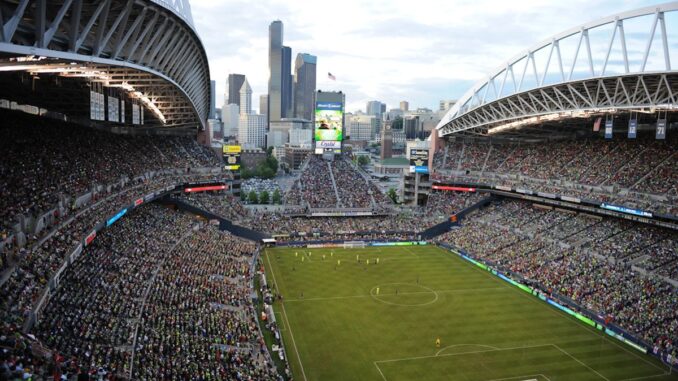
Opening weekend for the 2021 Major League Soccer (MLS) season is set for April 3-4! Thank God.
Those of us in the Pacific Northwest know this means the Sounders FC will soon take the pitch, and to a lesser degree, if one lives in a certain sales-tax-free state on the southern border of Magnificent Washington, so will the Portland Timbers. Regardless of what a dumb name that is.
However, the story nobody is talking about is the impending league-wide cancellation of all matches scheduled for Sunday, April 4th, what with coaches and managers predicting a majority of their first-team players will be napping all day after gorging themselves on Quiche Lorraine, spiral-sliced HoneyBaked Ham, cheesy potatoes and sticky buns. Or whatever they choose to eat for Easter Brunch, regardless of religious affiliation, but regarding the fact that people love to eat a big brunch. With breakfast cocktails. Followed by naps.
I offered to be a midfielder that day but no one at the Sounders ever returns my calls.
Time capsules are interesting things, and it’s worth noting (roughly) a year ago today, the MLS suspended the 2020 season. Of course, matches essentially, eventually, restarted. Even though history, statistics, reporters, and others will state Columbus won the 2020 MLS Cup, I know this is a scandalous lie secondary to a massive conspiracy that the Sounders actually won. It was great. I was invited to the after-party and everything.
It’s quite amazing the season happened at all, considering I spent the majority of this time last year anticipating the sudden closure of planet Earth and subsequently panic-bought beer daily (particularly from Matchless, Fremont, Reubens, Great Notion…mmmmmmm), repeated this for several weeks, then noticed by late May I (a) had gained 20 pounds and (b) hadn’t lost access to any microbrewery’s points of distribution.
At least I know where my priorities are.
So the Sounders and all of MLS were back, is back, and will be back again starting in April. But it’s not the same organization. I spoke with a colleague who happened to understand the club’s business operations and discovered some fascinating details about what impacts COVID made on the organization and what sports mean to us.
The MLS business model is a function of revenue generated by “butts in seats,” a.k.a. the combination of regular and season ticket sales. The Sounders have a particular advantage in this arena thanks to Lumen field and its gargantuan-ness. (Many clubs have teeny-tiny fields that only generate about $5.53 in revenue per game, so those of you with ample stadiums rejoice in your fortune). Meanwhile, with no butt-warmed seats to be found in any stadium, rumor has it club owners league-wide are still losing absurd amounts of money but can cover their losses and are doing so for their employees.
What? Capitalism doing right by actual humans? I know, but I happen to believe this absurd notion based on the following juicy insight:
The percentage of overall revenue from home game ticket sales for an MLS team is a lot bigger than other sports. For example, the NFL has so much TV money involved that any lack of screaming fans inside a given stadium wouldn’t (and didn’t) derail a season or result in bankruptcies. Thus, with revenue directly tied to people’s butts (so many jokes could come from this), every MLS team was in (and maybe in) a really tough spot and set to lose more revenue than other sports. The economics aren’t there; they should all be done, over, closed. Enter billionaire owners.
It has to be the billionaires dolling out some scratch to cover the losses that are keeping the MLS afloat. See? They’re not all bad, those crazy billionaires, what with their caviar breakfasts and full-scale backyard amusement parks.
Of course, last year’s season wasn’t without its painful cuts. Soccer programs, including recreational soccer, summer camps, and the youth club development program, were eliminated, much to the distress of up-and-coming players and particularly their parents who likely wondered just what in the hell they were going to do with their bouncy-ass, wound up hyper kids all summer. Well, spring and summer. There’s also a mid-winter break camp, but in the review mirror by the time COVID hit.
The loss of these programs may seem trivial, but it’s actually a pretty big deal as far as outreach and connection, the latter of which is now officially the most valuable commodity in the world. Not only do sports programs keep kids healthy (and parents sane), but in this case, access to first-team players is a big deal for any kid aspiring to do the soccer thing. I mean, imagine being a kid (or, in my case, adult) and meeting your hero, then having them be your COACH. I’d probably pass out.
There was, of course, an attempt to pivot to a digital soccer program experience – including the Sounder’s videography team creating and shipping content to families, featuring the beloved first-team players. Still, unlike various schools’ first attempts at distance learning, engagement was low since execution relied on heavy parent involvement. Those fools are working from home and don’t have the TIME for that.
There’s a chance soccer programs come back in 2022, but given MLS soccer generates revenue by putting the first team product on the field, selling the stadium, and selling season tickets, it’s unlikely.
This leaves some folks within MLS – particularly those whose job it is to foster public interaction with the teams through various real-life programs – in quite a predicament. It’s very similar to what many small business owners, particularly in the food & beverage industry, face if they have to close or sell their business: Finding work. After all, these folks’ careers are based on their ability to create connection and an experience by building something from nothing. Anyone hiring for that?
People will one day fill stadiums and arenas again, and any sport is excited for this. It’s the definition of fun – experiencing something you love with 40,000 other people shoulder to shoulder is what makes sports so special. It’s the commodity of connection, which turns out to be the most valuable commodity we’ve had all along.

